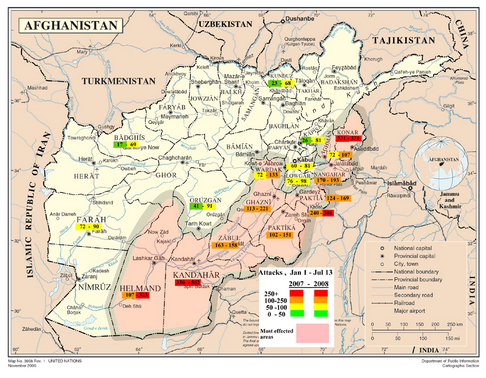Abu Gharib al Makki, a senior al Qaeda field commander from Saudi Arabia, has been killed in recent fighting with US forces in southwestern Afghanistan. The slain commander was lionized in a statement penned by al Qaeda in Afghanistan’s overall commander, Mustafa Muhammad Abu Yazid. Pajhwok Afghan News reported the scant details of the statement on Monday, indicating Abu Gharib was killed “48 hours ago” in the southwestern province of Farah.
Two separate clashes were reported during that time span in Farah province. In one incident, eight Taliban insurgents were killed after ambushing a logistics company’s fuel convoy in the Farahrod district, according to Farah’s provincial governor. Two fuel tanker trucks were destroyed during the ambush and at least one security guard was seriously injured.
A second clash broke out in the isolated Bakwa district after Taliban gunmen attempted to ambush a joint US and Afghan patrol. The Bakwa district, a long-known stronghold for Taliban insurgents and criminal gangs, has borne the brunt of this year’s Taliban activity in southwestern Afghanistan. The Taliban reportedly lost one fighter and six other were shot during the battle. It is unclear which clash Abu Gharib, whose real name is Kamal Saleem Atiya Fazli al Fazli, was killed in.
A massive clash between US forces and Taliban fighters on Aug. 9 in Farah’s Bala Baluk district left up to 20 insurgents dead and scores others injured. Arab fighters were reportedly among the dead during that battle as well, an alarming indicator that foreign fighters are making their way onto battlefields further west from the traditional battlegrounds of eastern Afghanistan or the southern hot-spots of Helmand and Kandahar provinces.
Heavy fighting has taken place throughout southwestern Afghanistan’s desert provinces since the spring of this year. A modest Provincial Reconstruction Team led by American forces is tasked with aiding in reconstruction and security measures throughout Farah province. Bakwa and the Bala Balouk districts remain hotly contested as small pockets of Taliban occupied villages continue to serve as key staging grounds for large-scale Taliban attacks in the southern and western areas of Afghanistan. Insurgents in Farah are mostly led by local gangs or Helmand-based Taliban groups. Abu Gharib’s death marks the first known al Qaeda in Afghanistan leader to be killed this far west in Afghanistan.
For more information on the insurgency in southwestern Afghanistan see, Coalition and Taliban vie for control of southwestern Afghanistan in Nimroz province and Coalition and Taliban vie for control of southwestern Afghanistan in Farah province.









4 Comments
Speaking of Taliban casualties I found it noteworthy that the British estimate over 250 were killed during the movement of the third turbine to the Kajaki dam.
Reuters: INTERVIEW-Britain’s Afghan commander hails “end of beginning”
Good riddance.
There were some stories on Bloomberg that I was reading a while back that some of the western provinces of Afghanistan were seeing increased financial and business investment from Iranian businesses. Now while Iran did back the Northern Alliance against the Taliban, I think it’s safe to say that the Iranian regime and it’s apparatchik banks (Bank Melli, ect.) aren’t really the best types to get involved with. It would be nice to see an Afghanistan Marshall Plan based on micro-loans from US capital to not only get Afghani entrepreneurs some working capital, but also counter Iranian investment.
good work! thats another evil man put to rest
The Thunder Run has linked to this post in the blog post From the Front: 09/03/2008 News and Personal dispatches from the front and the home front.